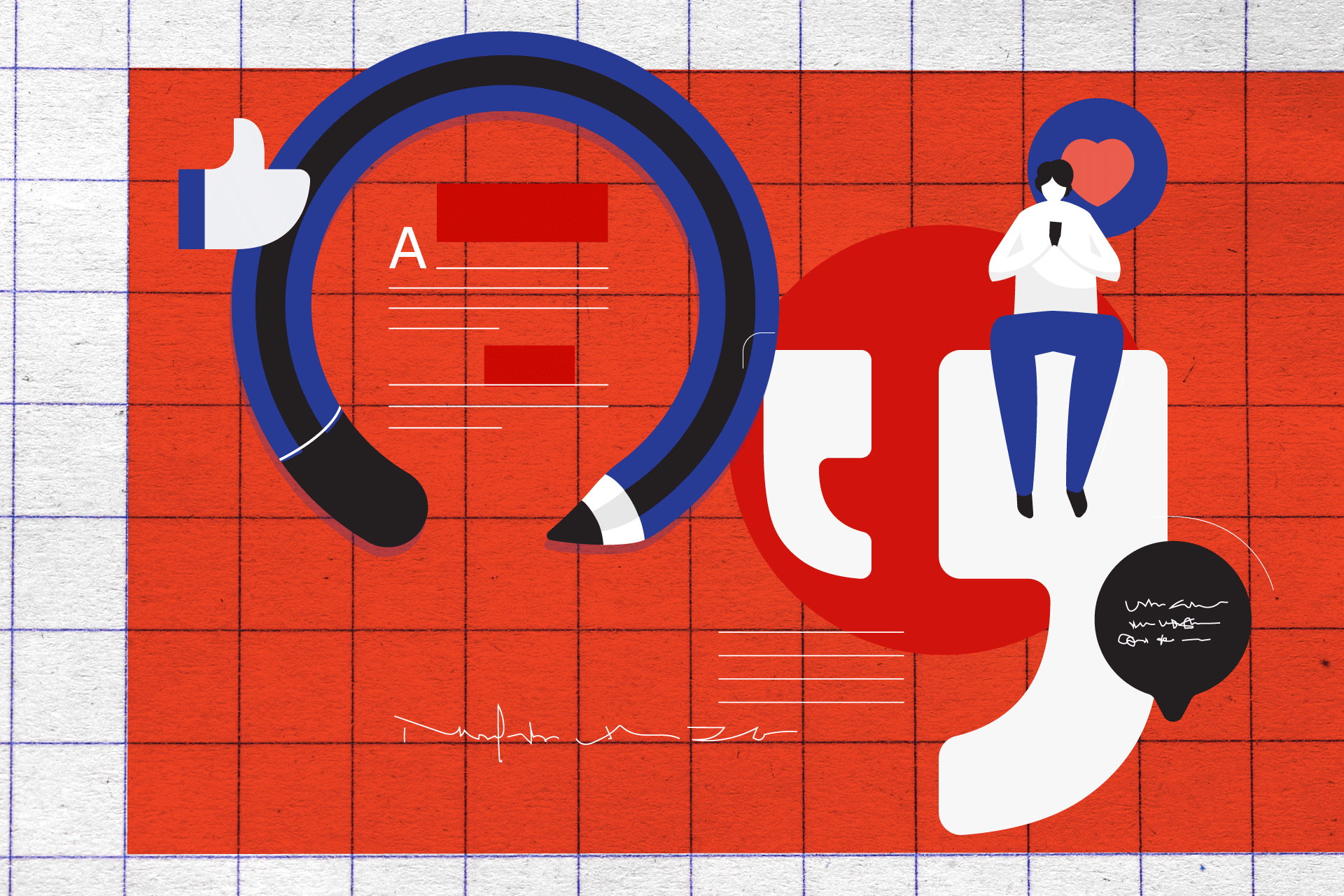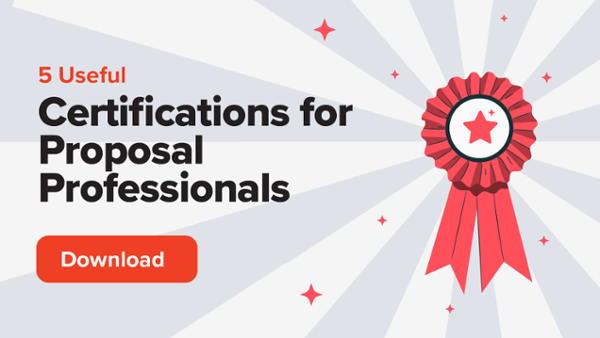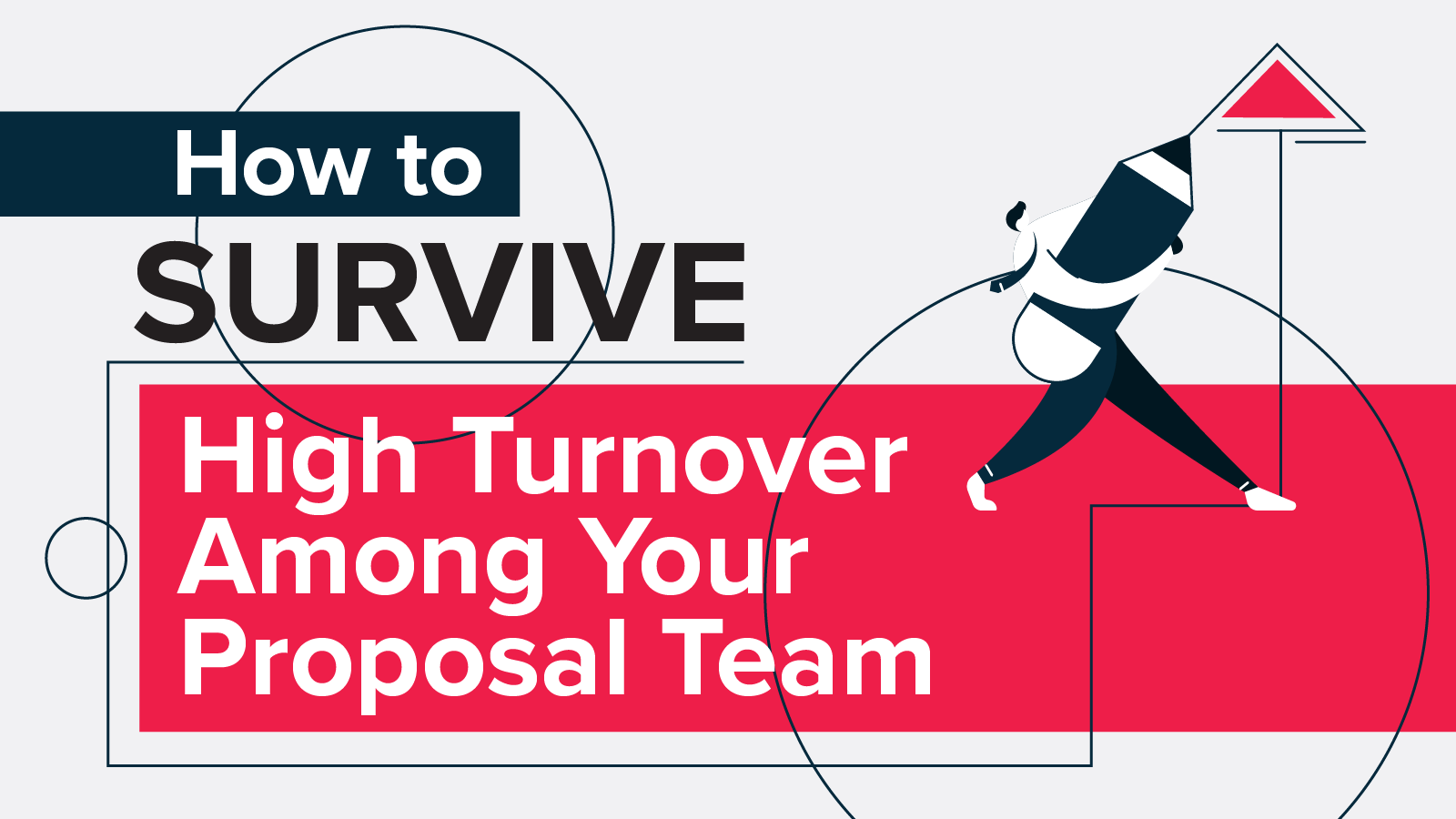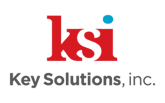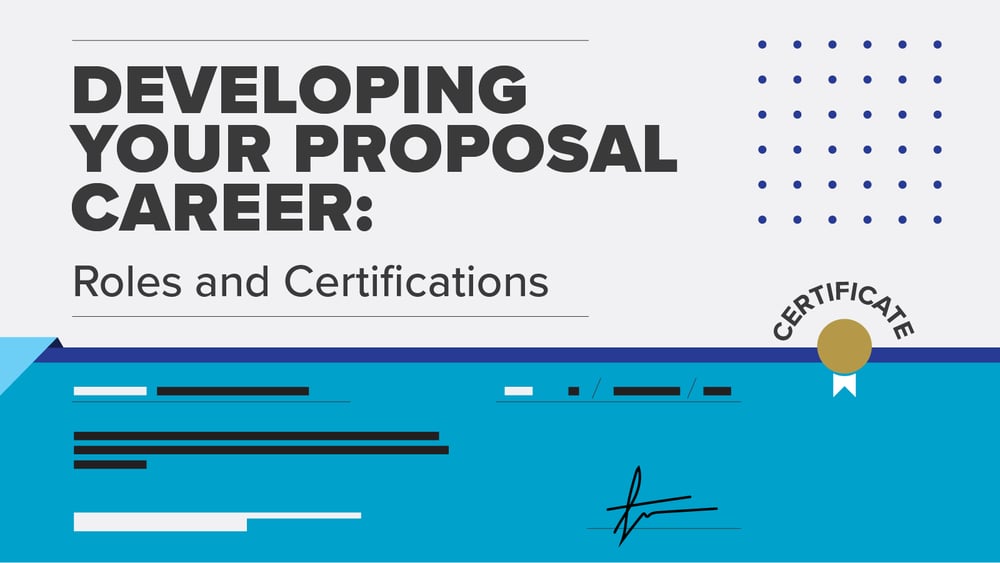
Professional certifications can help increase salary and expand professional possibilities. Certifications are an excellent avenue for a proposal professional’s career development. Whether you’re new to the field and eager to showcase your competency or a proposal veteran looking to grow or hone your skills, obtaining certifications can both improve and prove your capabilities. There’s no shortage of useful, industry-recognized certifications that cover valuable skills directly related to proposals. This article will explore why certifications are helpful in proposal career development, potential roles in the field, and certifications that will help move your career forward.
Certifications may serve as career stepping stones in distinct forms. While not all certifications can be categorized into one of these two groups, many in-demand industry certifications function either as Door Openers or Career Escalators for professionals with varying degrees of training and experience.
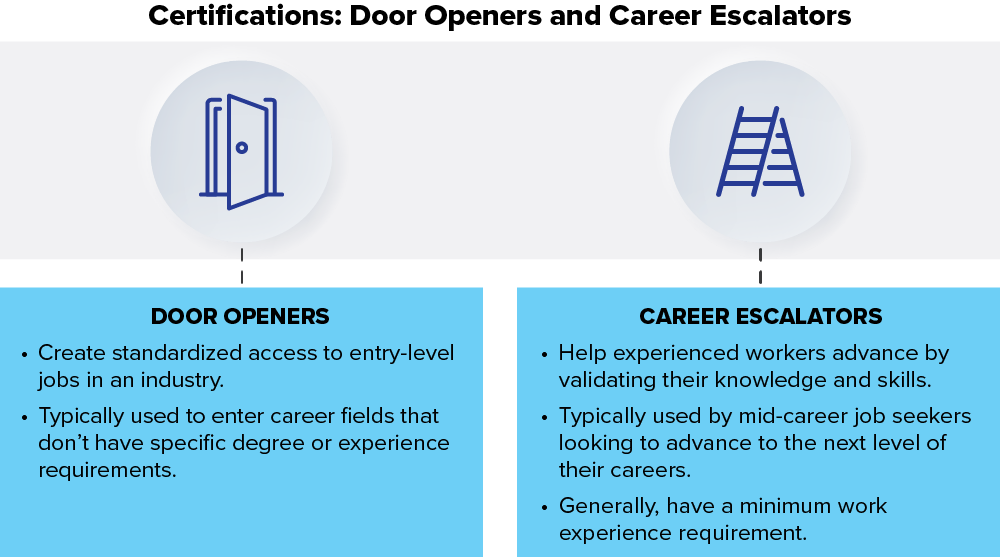
How do certifications help develop your proposal career?
Professional growth is the greatest benefit of certifications. By completing and getting certifications, you can apply for better jobs and progress in your career. Professional certification benefits include:
1. Get hired faster.
Certifications provide a more precise screening tool to identify qualified talent, validating a clearly defined set of knowledge and skills. Job applicants with certifications are more attractive to recruiters and employers and, thus, are more likely to quickly get a job offer. A certification is a great way to differentiate yourself from competing applicants, whether you’re applying as an employee or a 1099 consultant.
2. Better earning opportunities:
Including a proposal writing certification in your resume will help validate your knowledge and experience and can be leveraged to negotiate a higher salary. According to the APMP’s 2015 Compensation Report, the average APMP Practitioner-level certification recipient earns 18% more than the average Proposal Manager and the average APMP Professional-level certification recipient earn almost 31% more than the average Proposal Manager.
3. Advance more quickly.
Certified employees advance quickly within their companies, earning promotions at a more rapid pace in today’s skills-based economy.
4. Expand credibility.
Certifications show that you have extensive knowledge and understanding of best practices in the proposal process and mastery of how to apply best practices and lead others in their use.
5. Demonstrate commitment.
It takes time and dedication to earn a certification, especially at higher levels. It shows you care about your career and profession. This is the type of commitment to a challenging task that employers identify with. Colleagues and peers trust you more when they know that you have invested in your career and have demonstrated knowledge and analytic skills.
6. Gain self-confidence.
When you study and prepare for certification and pass, you feel motivated, disciplined, and proud of your success.
7. Improve language skills:
A certification will enhance your communication abilities within your field. Through the work of preparing for the certification, you learn the professional language and terms used in the real world. It also helps proposal developers speak the same language, making for more effective solutioning sessions.

Potential roles in your proposal career
There are a variety of career avenues available on the bid and proposal side of government contracting. It is important to note that people may move between these sorts of roles to further their careers. Oftentimes, different roles are intertwined throughout the opportunity lifecycle and offer different career paths depending on an individual’s interests and strengths. Below are brief descriptions of roles that benefit from certifications.
- Junior Proposal Writer: Working as a member of a proposal team, responsible for developing and submitting proposals. Creates compliant, compelling responses to requirements for resumes, past performance, and corporate capabilities statements in proposal documents. Applies interpersonal and interviewing skills to gather needed information from professionals to support writing. Identifies, resolves, and escalates (as needed) gaps and risks to proposal management. If you are starting a new career as a Proposal Writer check out The Complete Newbie’s Guide to a Career in Proposal Writing.
- Senior Proposal Writer: Typically has 6+ years of experience. Writes content for strategic, technical, and/or more difficult sections of a proposal. Depending on the organization and team structure, Senior Proposal Writers have been known to help develop win themes, and strategic messaging for the proposal, as well as help lead the writing team.
- Technical Writer: A senior writing role focused on the solution aspect of writing. They understand the ins and outs of an approach/process based on their background, knowledge, and/or training. They are a subject matter expert (SME) with strong writing abilities.
- Proposal Manager/Deputy Proposal Manager: Oversees all proposal activities, including directing proposal personnel, managing proposal schedules and deadlines, developing proposal outlines, and monitoring the progress of the proposal. Participates in the development and review of proposal strategies and themes. Assists in analyzing the RFP/bid requirements against the proposal outline to ensure both compliance and responsiveness to the customer’s issues and needs. Builds the compliance matrix and tracks the fulfillment of all requirements, and ensures requirements are adequately addressed without exceeding page limitations. Conducts regular proposal progress meetings or status calls and maintains the proposal schedule.
- Capture Manager: Identifies the resources needed to pursue a business opportunity; oversees bid strategies, pricing, teaming, and proposal strategies; and manages the transition from business opportunity to proposal development to award. Plans, documents, and manages the internal and external capture project efforts. Analyzes the organization’s strategic plans and products and aligns marketing intelligence with win strategy. Supports the proposal development phase by ensuring the strategy and customer intelligence for the opportunity are incorporated accurately into the proposal. To learn more, check out Capture Manager: The Sales Role Every Contractor Needs.
- Solutions Architect: Creates the overall technical vision for a specific solution to a business problem. They design, describe, and manage the solution. Involved in the proposal development phase to ensure the solution, approach, and all the relevant details of the solution are incorporated accurately into the proposal.
- Graphic Designer: Responsible for all graphic design activities for all versions of proposal documents. Requires proficiency in Adobe Creative Suite (Illustrator, Photoshop, and InDesign), Microsoft Office (PowerPoint and Project), and SharePoint. Quickly and accurately develops graphic content for bid/proposal-related deliverables. Works with Proposal Managers, Solution Architects, SMEs, Proposal Writers, Desktop Publishers, Editors, and Production Managers to establish a time-efficient workflow of documents. Works closely with pursuit teams to develop illustrations, icons, organization charts, process flows, and Gantt charts.
- Desktop Publisher: Arranges design elements on the page layout or within the proposal template, uses special formatting tools such as spacing and text size, and reviews and edits initial proofs and fixes any issues. Converts files and sends the final product to a printing company or uses an in-house high-resolution printer to produce a master copy or copies. Collects the text, graphics, and other materials they will need and formats them into a finished product.
- Editor: Copyedits and rewrites material for one-voicing, grammar, tense, adherence to a style guide, and general flow. Makes text reader-friendly, clear, and easily understood.
- Production Manager: Responsible for all printed, hardcopy deliverables associated with the proposal submission – binders, CDs/flash drives, and supplemental materials. This is a common position that DTP/Graphics Designers shift into because it typically involves the management of a team and simultaneous opportunities (depending on the organization and team).
- Orals Coach: Orchestrates the entire oral presentation event – conducts personal coaching sessions on presentation dynamics, builds confidence and credibility of the orals team, facilitates practice sessions, and assists the oral proposal team in presenting a winning proposal.
- Director of Proposal Development: Responsible for leading, planning, scheduling, and overseeing the timely development and delivery of high-quality responses to business opportunities, from pre-RFP to post-submission activities, in a fast-paced environment. Balances RFP releases, active bids, and the schedules of the proposal team members to ensure all opportunities have appropriate resources for a winning outcome.
- Business Development Manager/Lead: Plays a crucial role in the success of an organization. Generates new sales leads, negotiates client pricing, and forecasts sales revenue, all to support one of the most important business development responsibilities — helping organizations maximize their profits.
- Proposal Development Consultants: Independent contractors or people who work for proposal consulting companies. They provide companies with additional options for resources across all proposal functions. Roles vary from leadership of proposal engagements to assisting in surge situations.
Certifications that will enhance your career
There are a variety of certifications that cover valuable skills directly related to proposals. Below are some of the most popular and well-regarded certifications in the field.
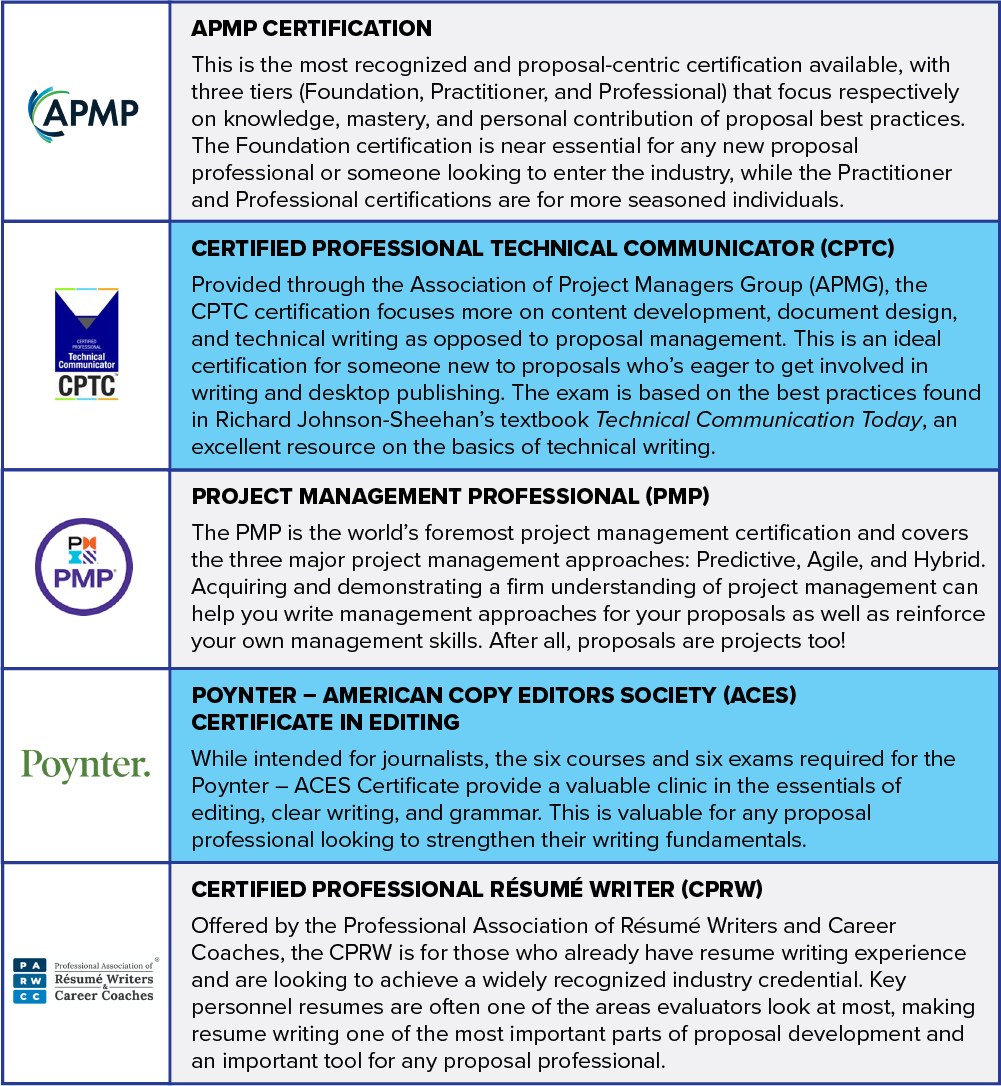
In Conclusion
Certifications are a notable tool for a proposal professional’s career development. Certifications improve, expand, and validate proposal development skills. There’s no shortage of useful, industry-recognized certifications that cover valuable skills directly related to proposals. Nor is there a shortage of potential roles in government contracting to exercise your skills.
If you are starting a new career in government contracting or looking to advance to the next level, certifications may provide the needed oomph to push you forward.


